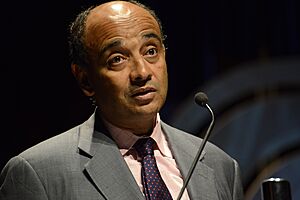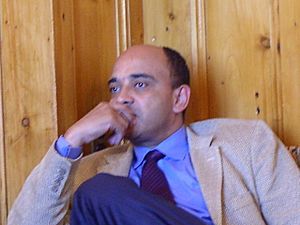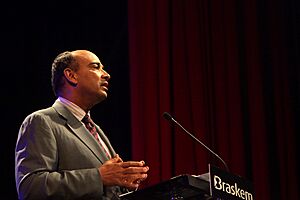Kwame Anthony Appiah facts for kids
Quick facts for kids
Kwame Anthony Appiah
FRSL
|
|
|---|---|

Appiah at Fronteiras do Pensamento Porto Alegre 2013
|
|
| Born | 8 May 1954 London, England
|
| Alma mater | Clare College, Cambridge |
| Spouse(s) | Henry Finder |
| Era | Contemporary philosophy |
| Region |
|
| School | Cosmopolitanism |
| Thesis | Conditions for Conditionals (1981) |
|
Main interests
|
Probabilistic semantics, political theory, moral theory, intellectual history, race and identity theory |
Kwame Anthony Appiah is a well-known English-American philosopher and writer. He writes about important ideas like what is right and wrong (ethics), how societies should be organized (political philosophy), and how language and minds work. He also studies the history of ideas in Africa.
Appiah is a professor of philosophy and law at New York University. Before that, he taught at Princeton University. In January 2022, he was chosen to be the President of the American Academy of Arts and Letters, which is a group that honors artists, writers, and composers.
Contents
Early Life and Education
Kwame Anthony Appiah was born in London, England, on May 8, 1954. His mother, Peggy Cripps Appiah, was an English art historian and writer. His father, Joe Appiah, was a lawyer, diplomat, and politician from the Ashanti Region in Ghana.
His father, Joe Appiah, was a leader of a new political party in Ghana from 1970 to 1972. At the same time, he was the president of the Ghana Bar Association. Later, from 1977 to 1978, he represented Ghana at the United Nations.
Kwame Anthony Appiah grew up in Kumasi, Ghana. He went to school at Bryanston School and then Clare College, Cambridge, in England. There, he earned his bachelor's and PhD degrees in philosophy. He has three sisters named Isobel, Adwoa, and Abena. As a child, he often visited England and stayed with his grandmother, Dame Isobel Cripps.
Personal Life
Kwame Anthony Appiah lives with his husband, Henry Finder, who is an editorial director for The New Yorker magazine. They have homes in Manhattan and in Pennington, New Jersey, where they have a small sheep farm.
Appiah became a citizen of the United States in 1997. His nephew is the actor Adetomiwa Edun.
Career and Contributions
From 1981 to 1988, Appiah taught philosophy and African-American studies at several universities. These included the University of Ghana, Cornell University, Yale University, Harvard University, and Princeton University. He was a professor at Princeton until 2014. He also taught law at Fordham University in 2008.
Appiah was part of the board for PEN American Center, which supports freedom of expression. He also helped judge the PEN/Newman's Own First Amendment Award. He has given talks at many places in the US, Germany, Ghana, South Africa, and Paris. Since 2014, he has been a professor of philosophy and law at New York University.
His early research at Cambridge was about how probability helps us understand meaning. In 1992, Appiah published a book called In My Father's House. This book won the Herskovitz Prize for African Studies. He has written other important books, including Colour Conscious (with Amy Gutmann), The Ethics of Identity (2005), and Cosmopolitanism: Ethics in a World of Strangers (2006). He also worked closely with Henry Louis Gates Jr. to edit Africana: The Encyclopedia of the African and African-American Experience. In 1995, Appiah became a member of the American Academy of Arts and Sciences.
In 2008, Appiah released Experiments in Ethics. In this book, he looked at how scientific research can help us understand ethical ideas. That same year, he received the first Joseph B. and Toby Gittler Prize from Brandeis University. This award recognized his work on understanding different races, ethnic groups, and religions.
Besides his academic work, Appiah has also written fiction books. His first novel, Avenging Angel, is a mystery set at the University of Cambridge. He also wrote Nobody Likes Letitia and Another Death in Venice.
Appiah has received many awards and honors. In 2010, Foreign Policy magazine named him one of the top global thinkers. On February 13, 2012, he received the National Humanities Medal at the White House.
Appiah currently leads the jury for the Berggruen Prize, which honors thinkers who have made important contributions to humanity. He also serves on the academic board for the Berggruen Institute's Philosophy & Culture Center. In January 2022, he was elected President of the American Academy of Arts and Letters.
Key Ideas
Appiah's early work focused on how we understand meaning and probability. However, his more recent books explore big questions about race, racism, and identity. He also writes about moral theory, which is about what is right and wrong.
His current work looks at three main areas:
- The basic ideas behind liberalism, which is a political philosophy about freedom and equal rights.
- How we can find out what is truly valuable in life.
- How our ideas about right and wrong connect to how we live our lives.
These ideas are also explored in his book Cosmopolitanism: Ethics in a World of Strangers.
Appiah has also written about modern culture. He believes that today's culture is global and connects people across different countries.
Cosmopolitanism
Appiah has been influenced by the idea of cosmopolitanism. This idea comes from ancient Greek thinkers like Diogenes and African American thinkers like W. E. B. Du Bois. In his article "Education for Global Citizenship," Appiah explains his view of cosmopolitanism. He describes it as "universality plus difference." This means that we should care about all people around the world (universality), but also respect their different cultures (difference).
He believes that caring for people comes first. We respect different cultures not just because cultures are important, but because people are important, and their culture matters to them. So, cultural differences should be respected as long as they don't harm people or go against our basic care for everyone's life and well-being.
In his 2006 book, Cosmopolitanism: Ethics in a World of Strangers, Appiah shares two main ideas about cosmopolitanism:
- We have duties to other people that go beyond just sharing a country with them.
- We should always appreciate the value of life and try to learn about the beliefs and practices of others.
Kwame Appiah often visits universities to talk to students. One thing he suggests is, "See one movie with subtitles a month." This helps people learn about other cultures.
In his 2018 book, Lies that Bind, Appiah explores how we understand different identities like religion, race, country, and social class.
Awards and Honors
- Anisfield-Wolf Book Award for In My Father's House, April 1993
- Herskovitz Award of the African Studies Association for In My Father's House, December 1993
- Annual Book Award, North American Society for Social Philosophy for Color Conscious, May 1997
- Ralph J. Bunche Award, American Political Science Association for Color Conscious, July 1997
- Elected member of the American Philosophical Society
- Editors' Choice New York Times Book Review, The Ethics of Identity, June 2005
- Amazon.com Best Books of 2005, Top 10 Editors' Picks: Nonfiction, The Ethics of Identity, December 2005
- Arthur Ross Book Award of the Council on Foreign Relations, Cosmopolitanism, May 2007
- A Times Literary Supplement's Book of the Year 2010 for The Honor Code
- One of New York Times Book Review's 100 Notable Books of 2010 for The Honor Code
- New Jersey Council for the Humanities Book Award 2011 for The Honor Code
- In August 2016, he was given the title of Nkosuahene of Nyaduom. This means he became a Ghanaian chief of the Ashanti people in his family's ancestral area in Ghana.
- In 2017, he was elected as a Fellow of the Royal Society of Literature.
- In June 2017, the Carnegie Corporation of New York named him one of its 2017 "Great Immigrants."
- In December 2021, he received the prestigious Gold Medal from The National Institute of Social Sciences.
- In June 2022, Professor Appiah received an Honorary Degree from Cambridge University. This degree is given to people who have made amazing achievements in their fields.
- 2024 John W. Kluge Prize for Achievement in the Study of Humanity, awarded by the Library of Congress. This prize recognizes work in areas not covered by the Nobel Prizes.
See also
 In Spanish: Kwame Anthony Appiah para niños
In Spanish: Kwame Anthony Appiah para niños
- African philosophy
- Africana philosophy
 | William Lucy |
 | Charles Hayes |
 | Cleveland Robinson |



